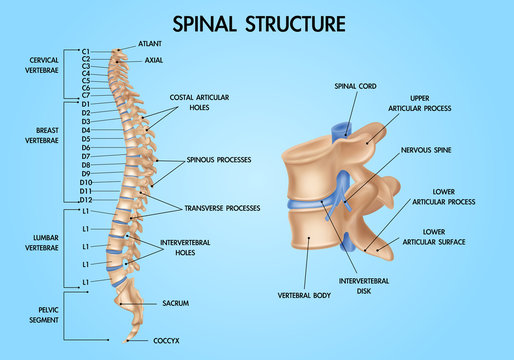LAHORE SPINE CARE
Table of Contents
ToggleOverview of Spine Health
Obesity and spine health impact overall health. Carrying extra weight can make the pressure on your spinal discs higher, which speeds up joint damage and raises your chances of getting osteoarthritis, spinal stenosis and herniated discs. Keeping your weight under control with diet and exercise cuts down on your risks considerably.
Spine health is a significant concern globally and has a strong correlation with obesity, often overshadowed by its effects on other chronic conditions like cardiovascular health and diabetes. The spine, composed of 33 vertebrae across various regions, plays a crucial role in supporting the body, facilitating movement, and protecting the spinal cord. Excess weight places undue mechanical stress on the spine, particularly in the lumbar region, leading to conditions such as degenerative disc disease and herniated discs. Obesity also contributes to poor posture, altered biomechanics, inflammation, and compromised muscle function, all of which exacerbate spinal issues.
Lahore Spine Care (Neuro and spine care) provides painless, non-invasive, and skilled physiotherapy and chiropractic therapy to restore spinal and joint alignment, relieve pain, correct posture, improve muscle function, enhance stability, and promote physical performance. Managing spine health in obesity involves weight management, regular exercise, maintaining good posture, and considering medical interventions when necessary. These approaches collectively aim to reduce spinal strain, improve stability, and enhance overall quality of life. Understanding the intricate relationship between obesity and spine health empowers individuals to adopt proactive measures for long-term spinal health.
The Impact of Obesity on Spine Health
Obesity is a growing global health concern, with numerous studies linking it to various chronic conditions. While much attention is given to its impact on cardiovascular health, diabetes, and other metabolic disorders, the relationship between obesity and spine health is often overlooked. However, the spine, a central structure in the human body, is significantly affected by excess weight. Understanding this connection is crucial for both preventing and managing spinal issues in individuals struggling with obesity.
The Anatomy of the Spine
To comprehend how obesity impacts spine health, it’s essential first to understand the basic anatomy of the spine. The spine consists of 33 vertebrae divided into five regions: cervical, thoracic, lumbar, sacral, and coccygeal. These vertebrae are cushioned by intervertebral discs, which act as shock absorbers. The spine supports the body’s weight, allows for flexible movement, and protects the spinal cord, a vital component of the central nervous system.

How Obesity Affects the Spine
- Increased Mechanical Load
- One of the most direct impacts of obesity on the spine is the increased mechanical load. Excess body weight, particularly around the abdomen, places additional stress on the spine, especially the lumbar region (lower back). This extra pressure can lead to a range of issues, including degenerative disc disease, herniated discs, and spinal stenosis.

- Altered Posture and Biomechanics
- Obesity often leads to poor posture and altered biomechanics. Excess weight can cause a forward shift in the body’s center of gravity, leading to hype lordosis (excessive inward curvature of the lower spine). This abnormal curvature can strain the muscles, ligaments, and discs, increasing the risk of pain and injury.
- Inflammation and Metabolic Factors
- Obesity is associated with chronic low-grade inflammation and metabolic changes, which can negatively affect spine health. Adipose tissue (fat) produces inflammatory cytokines and adipokines that can contribute to systemic inflammation. This inflammation can exacerbate conditions like osteoarthritis and accelerate the degeneration of spinal structures.
- Impact on Intervertebral Discs
- The intervertebral discs, which provide cushioning between the vertebrae, are particularly vulnerable to the effects of obesity. Excess weight can accelerate disc degeneration and increase the risk of herniation. Degenerative disc disease is more common in obese individuals and often leads to chronic back pain and reduced mobility.
- Compromised Muscle Function
- The muscles supporting the spine, including the core muscles, are crucial for maintaining stability and alignment. In obese individuals, these muscles can become weakened or imbalanced due to the excess load and reduced physical activity. Poor muscle function further exacerbates spinal issues and increases the likelihood of injury.

Managing Spine Health in Obesity
- Weight Management
- The most effective way to mitigate the impact of obesity on spine health is through weight management. Achieving and maintaining a healthy weight reduces the mechanical load on the spine and lowers the risk of associated conditions. This can be accomplished through a combination of a balanced diet, regular physical activity, and behavioral changes.
- Exercise and Physical Therapy
- Regular exercise is crucial for both weight management and spine health. Low-impact activities such as walking, swimming, and cycling are excellent options for obese individuals. Strengthening the core muscles through targeted exercises can also improve spinal stability and reduce pain. Physical therapy can provide personalized exercise programs and techniques to manage and prevent spine-related issues.


- Posture and Ergonomics
- Maintaining good posture and ergonomics is essential for spine health, especially for those who are overweight. Simple changes, such as using ergonomic furniture, practicing proper lifting techniques, and avoiding prolonged sitting, can make a significant difference in reducing spinal strain.


- Medical Interventions
- In cases where obesity-related spinal issues are severe, medical interventions may be necessary. This can include pain management strategies, such as medications and injections, as well as surgical options for conditions like herniated discs or spinal stenosis. It’s important to consult with healthcare professionals to determine the most appropriate treatment plan. Why you consult Lahore Spine Care
- Lahore Spine Care (Neuro and spine care) provides painless, non-invasive, and skilled Physiotherapy and chiropractic therapy to restore spinal and joint alignment, relieve pain, correct posture, improve muscle function, enhance stability, and promote physical performance.
Conclusion
The impact of obesity on spine health is multifaceted, involving increased mechanical stress, altered biomechanics, inflammation, and compromised muscle function. Addressing this issue requires a comprehensive approach that includes weight management, exercise, proper posture, and medical interventions when necessary. By understanding the connection between obesity and spine health, individuals can take proactive steps to protect their spine and improve their overall quality of life.
LAHORE SPINE CARE is proudly powered by WordPress